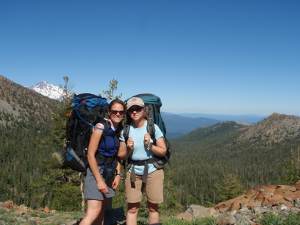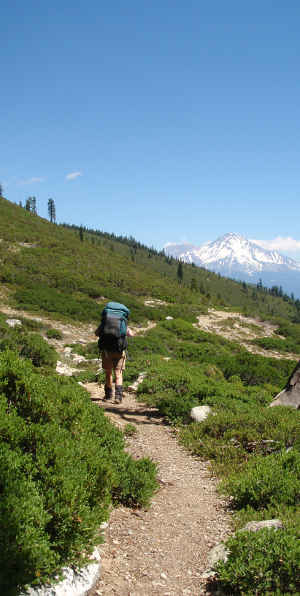
PCTA researchers Briget Eastep and Marni Goldenberg with Mt. Shasta in the background. (photo courtesy of PCTA)
In addition to being Trailspace's Community Evangelist, I spend a fair amount of time working with the Pacific Crest Trail Association to help protect, preserve and promote the Pacific Crest Trail, a 2,650-mile path from Mexico to Canada that traces some of the most spectacular mountains in the west.
PCTA's mission includes coordinating volunteers to maintain the trail, protecting the trail corridor from threats, and working with the Forest Service to keep the trail open and safe.
Why do we do what we do? Hikers know intuitively that the PCT experience is valuable. The experience itself is seductive enough to call millions to hike and thousands to volunteer and maintain the trail. Physiologically, we know that hiking benefits our bodies, increasing calcium deposition in the bones, reducing blood pressure, increasing lean muscle mass and improving blood chemistry. Plus, it just feels good! But until recently there's been little research on what psychological benefits the PCT provides, and how different people get different benefits from the PCT experience.
The following is an excerpt from an article entitled "The Value of Hiking the PCT," by Katherine Soule and Marni Goldenberg, which appeared in the July 2011 PCT Communicator magazine:
Briget Eastep near Castle Crags State Park. (photo courtesy of PCTA)In July 2010, researchers Marni Goldenberg and Briget Eastep caught up with the “herd” of hikers near Mount Shasta to discover the benefits of long distance hiking on the Pacific Crest Trail.
Known as the “Research Girls,” they hiked for four days, interviewing a group of 37 male and 19 female hikers between 20 and 66 years old. The hikers participated in more than 13 hours of interviews and had hiked a cumulative 78,382 miles on the PCT at the time of their interviews. Data from the interviews was transcribed, coded, and entered into a qualitative data analysis software program.
The research revealed a number of outcomes from hiking the trail. The overall experience, the physical act of hiking, and the interactions with hiking partners caused hikers to have new experiences and opportunities and improve their fitness. The opportunity for new experiences led to developing backpacking and long distance hiking skills, increasing environmental appreciation, and feeling challenged. In turn, these caused hikers to develop new perspectives, which led to personal growth. Hikers believed that they will transfer the benefits and lessons learned from their PCT experience into other areas of their lives. Additionally, these hikers believe that the PCT has increased their fun and enjoyment of life as well as causing them to have warm relationships with other people.
The researchers discovered interesting differences between male and female PCT hikers.
Female hikers appeared to gain self-respect, esteem, or confidence from their Trail experiences, especially through hiking and interacting with other people. Male hikers appeared to enjoy warm relationships with others through their new perspectives gained from hiking, the new experiences and opportunities the Trail provides, and being in the wilderness or outdoors.
While the experience of long-distance hiking on the PCT is truly different for each hiker, the experience does offer numerous life values including a sense of belonging, self-fulfillment, a sense of accomplishment, appreciation, self-awareness, self-respect/esteem/confidence, warm relationships with others, fun and enjoyment of life, and transference of benefits of other areas of one’s life.
Reprinted with permission of the Pacific Crest Trail Association.
Trailspace is proud supporter of the Pacific Crest Trail Association and other outdoor and environmental non-profit organizations. Visit the PCTA website to support their mission to protect the trail, and "like" PCTA on Facebook to continue the conversation about what benefits you get from the trail.

 by Seth Levy
by Seth Levy










